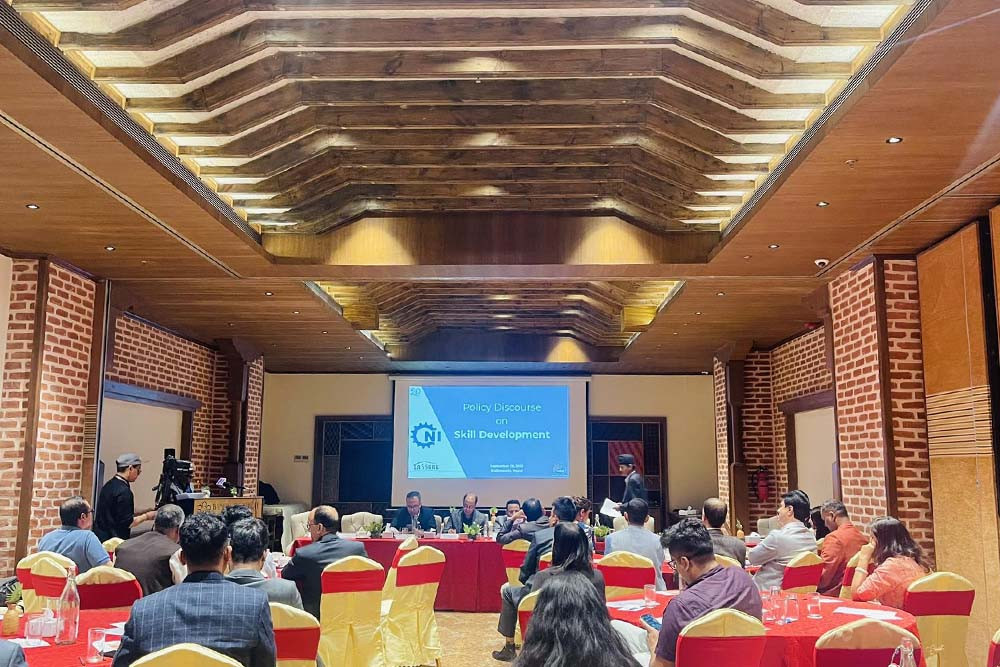
KATHMANDU: The Confederation of Nepalese Industries (CNI) hosted a programme titled ‘Policy Discourse on Skill Development' emphasizing the critical role of skill development in driving sustainable economic growth in Nepal. The event recently held in Kathmandu brought together prominent government officials, industry leaders and experts to address key issues that have been hindering the country's skill-enhancement efforts.
CNI, known for its advocacy in industrial development, investment, and trade facilitation, organised the event to address the pressing challenges in Nepal's Technical and Vocational Education and Training (TVET) sector.
Among the distinguished guests were Purushottam Ojha, former Secretary and Chair of the Policy Committee; Hari Lamsal, Joint Secretary of the Ministry of Education, Science and Technology (MoEST); Kewal Prasad Bhandari, Secretary of the Ministry of Labour, Employment and Social Security (MoLESS); Toya Narayan Gyawali, Secretary of the National Planning Commission (NPC). Others present at the programme were Birendra Raj Pandey, Officiating President of CNI; Rohit Gupta, Vice President of CNI; and Deepak Raj Joshi, Director General of CNI.
CNI Director General Joshi initiated the programme, setting the stage for discussions on the critical importance of skill development in Nepal's economic landscape. Purushottam Ojha, Chair of Make in Nepal Swadeshi Policy Committee, delivered the opening remarks providing essential context for the discussions. He expressed his views on National Employment Policy, underscoring a critical issue — shortage of skilled, unskilled, and semi-skilled human resources in the country. This shortage of skilled labour has had a profound impact on various sectors, including industrial development, construction, tourism, information technology, and water resources, according to Ojha. One of the key points he raised was the absence of need assessment in human resource planning. This has resulted in a misalignment between the skills available and the skills needed in different sectors, Ojha said and added that lack of systematic assessment of these needs has hindered the overall growth and development of these sectors.
The 16th periodic plan has its significance in addressing the skill gap and fostering sustainable economic growth, Ojha said. This planning framework can serve as a roadmap for addressing the country’s skill deficit comprehensively, he added. A considerable number of Nepalis, particularly students, were seeking opportunities abroad due to the inadequate availability of skill development programmes at home, he opined.
CNI Officiating President Pandey made a presentation focused on skill development. He covered a wide range of topics, including discussions on prosperity, the country's graduation from LDC, and factors contributing to rising production costs. He highlighted the current situation of TVET. He delved into the challenges hindering skill development, and issues such as LMIS (Labour Market Information System), skill mismatch, the link between training and the job market, insufficient research-based information, the need for a more private sector-oriented approach, access to education, and the importance of lifelong learning.
He elaborated on the private sector's expectations and potential contribution — research, innovation, information management, capacity building, quality assurance, sustainable financing, monitoring, evaluation, and feedback mechanisms — to address the challenges. He highlighted recent advancements and the private sector's engagement, specifically CNI's involvement in the PPP (Public-Private Partnership) Working Group Policy Guiding Document and the signing of memoranda of understanding (MoU) with entities such as CTEVET, universities, colleges, and sector skills committees.
He offered insights into the project achievements of the ELMS initiative organised by CNI, FNCCI, HAN, FNCSI, and FCAN, showcasing the collaborative efforts of these organisations in the field of skill development and employment.
SVP Lekhraj Pokharel of the Confederation of Bagmati Province Industries (CBPI) also presented a range of critical points highlighting key issues affecting industrial growth in Bagmati Province. He pointed out the shortage of technician-level workforce in the region and the adverse impact on the industrial sector caused by the shortage. He also talked about the challenges of low productivity among young technicians and he briefed CBPI's proactive approach to addressing these issues.
The event featured expert opinions from Amrita Sharma, the lead researcher of the Institute for Integrated Development Studies (IIDS) and a member of the CNI Women Leadership Forum; Ram Hari Lamichhane, TVET Expert; and Shiv Raj Adhikari, Associate Professor of Economics at Tribhuvan University.
Sharma acknowledged that TVET has not reached its full potential in the current context. She stressed that there is a collective expectation from the government sector to commit more to developing TVET and expressed concern over the lack of commitment and capacity building in this regard. She lamented that many people still lack an understanding of what TVET entails and what it can achieve. She encouraged everyone to collaborate in finding solutions to the challenges being faced by the TVET sector. Sharma, lead researcher of IIDS, also touched on the topic of Recognition of Prior Learning (RPL), emphasizing its importance in acknowledging the skills and knowledge that individuals bring from their prior experiences. Furthermore, she hinted at the possibility of changes in the working modality in the country in the near future, underlining the need to be prepared for these potential transformations.
TVET expert Lamichhane addressed several critical issues concerning TVET in the country. He stressed the importance of coordinating policies between ministries rather than having separate policies for each ministry. His recommendations included policy coordination, minimising the frequent transfer of government officials, supporting sector skills committees, and the development and implementation of a skill development policy. He also emphasized the need for motivation to promote apprenticeships and practical partnerships between TVET institutions and industries.
Likewise, Adhikari, Associate Professor of Economics at TU, stressed the need to implement policies to reduce unemployment in the country. “The economic growth should not only be measured in terms of GDP but should also create employment opportunities for the population,” he said. He underscored the need for regular updates to the curriculum and courses offered in the country's educational institutions.
Adhikari pointed out a significant difference in economic outcomes between individuals who receive training from the Council for Technical Education and Vocational Training (CTEVT) and those trained by private sector entities. This highlights the importance of ensuring the quality and relevance of training programmes. He strongly advocated for a greater focus on accountability and responsibility within organisations involved in TVET. He sought out the need for the establishment of business incubation centres which can play a crucial role in nurturing entrepreneurship and innovation and fostering economic growth.
The programme organised by CNI served as a platform for comprehensive discussions, reflecting Nepal's commitment to addressing the challenges hindering its skill development efforts and laying the foundation for sustainable economic growth.


-1772534372.jpeg)

-1772527494.jpeg)
